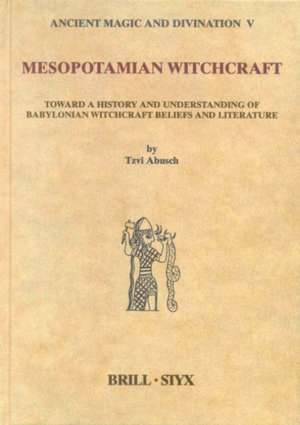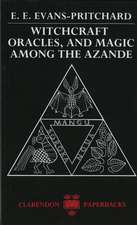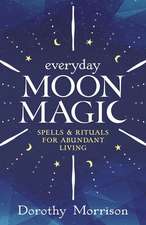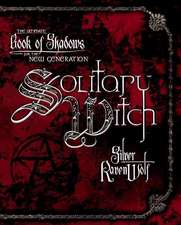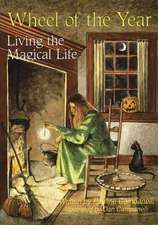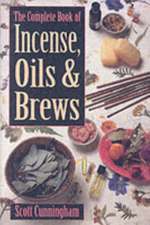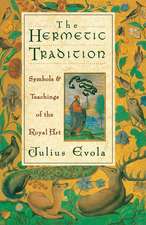Mesopotamian Witchcraft: Towards a History and Understanding of Babylonian Witchcraft Beliefs and Literature: Ancient Magic and Divination, cartea 5
Autor Tzvi Abuschen Limba Engleză Hardback – 4 iun 2002
With chapters on the changing forms and roles of witchcraft beliefs, the ritual function, form, and development of the Maqlû text (the most important ancient work on the subject), and the meaning of the Maqlû ceremony, as well as the ideology of the final version of the text. The volume significantly contributes to our understanding of the Maqlû text, and the reconstruction of the development of thought about witchcraft and magic in Mesopotamia.
Din seria Ancient Magic and Divination
- 18%
 Preț: 1526.83 lei
Preț: 1526.83 lei - 18%
 Preț: 1548.88 lei
Preț: 1548.88 lei - 18%
 Preț: 758.56 lei
Preț: 758.56 lei - 18%
 Preț: 940.84 lei
Preț: 940.84 lei - 18%
 Preț: 1508.75 lei
Preț: 1508.75 lei - 18%
 Preț: 894.61 lei
Preț: 894.61 lei - 18%
 Preț: 1492.19 lei
Preț: 1492.19 lei - 18%
 Preț: 1151.34 lei
Preț: 1151.34 lei - 5%
 Preț: 943.97 lei
Preț: 943.97 lei - 18%
 Preț: 745.93 lei
Preț: 745.93 lei - 18%
 Preț: 936.60 lei
Preț: 936.60 lei - 18%
 Preț: 1435.37 lei
Preț: 1435.37 lei - 18%
 Preț: 1450.77 lei
Preț: 1450.77 lei - 18%
 Preț: 1736.52 lei
Preț: 1736.52 lei - 18%
 Preț: 1853.86 lei
Preț: 1853.86 lei - 18%
 Preț: 792.79 lei
Preț: 792.79 lei - 18%
 Preț: 1543.66 lei
Preț: 1543.66 lei - 18%
 Preț: 1187.03 lei
Preț: 1187.03 lei - 18%
 Preț: 1080.09 lei
Preț: 1080.09 lei - 18%
 Preț: 881.45 lei
Preț: 881.45 lei
Preț: 995.09 lei
Preț vechi: 1213.52 lei
-18% Nou
Puncte Express: 1493
Preț estimativ în valută:
190.44€ • 198.08$ • 157.21£
190.44€ • 198.08$ • 157.21£
Carte disponibilă
Livrare economică 22 martie-05 aprilie
Preluare comenzi: 021 569.72.76
Specificații
ISBN-13: 9789004123878
ISBN-10: 9004123873
Pagini: 314
Dimensiuni: 155 x 235 mm
Greutate: 0.62 kg
Editura: Brill
Colecția Brill
Seria Ancient Magic and Divination
ISBN-10: 9004123873
Pagini: 314
Dimensiuni: 155 x 235 mm
Greutate: 0.62 kg
Editura: Brill
Colecția Brill
Seria Ancient Magic and Divination
Notă biografică
Tzvi Abusch, Ph.D. in Assyriology from Harvard University, is Rose B. and Joseph Cohen Professor of Assyriology and Ancient Near Eastern Religion. He has taught at the Jewish Theological Seminary and the Hebrew University of Jerusalem and has held a number of awards and fellowships. His particular area of interest is Ancient Mesopotamian Religious Literature and Mesopotamian Anti-witchcraft Literature.
Recenzii
'...the articles presented here provide many insights into the social, literary, and historical fabric into which the Maqlu texts were woven, and offer the interested comparativist a number of avenues for further research.’
Scott B. Noegel, Journal of Hebrew Scriptures, 2002-2003.
“This impressively wide-ranging volume had its origins in a 2013 conference in Exeter on ‘Demons and Illness’. Adopting a comparative approach, the articles examine the complex associations between demons and illness across a diverse array of geographical, chronological, and religious contexts, from ancient Egypt and Mesopotamia to 17th-century Europe. An introduction by the editors notes the value of such a comparative approach (building upon previous studies addressing the topic within specific contexts or periods) for the broader exploration of ‘continuities and changes’ (p. 8), while also discussing some of the challenges faced, including the variable nature and survival of sources and the issue of comparable terminology across such a diverse range of contexts (not least, the term ‘demon’ itself!). (…)
Given the sheer breadth of its scope, the volume is, of course, illustrative rather than comprehensive in its coverage, yet there is a definite coherence to its content, aided by the introduction and afterword which bookend the work and help begin to draw out the threads of commonality and difference. As such it constitutes a significant and welcome resource for comparative explorations of historicalcultural links between demons, illness, medicine, and magic, while offering a clear invitation to future work.”
- Matthew A. Collins, in Society for Old Testament Study Book List 2019
Scott B. Noegel, Journal of Hebrew Scriptures, 2002-2003.
“This impressively wide-ranging volume had its origins in a 2013 conference in Exeter on ‘Demons and Illness’. Adopting a comparative approach, the articles examine the complex associations between demons and illness across a diverse array of geographical, chronological, and religious contexts, from ancient Egypt and Mesopotamia to 17th-century Europe. An introduction by the editors notes the value of such a comparative approach (building upon previous studies addressing the topic within specific contexts or periods) for the broader exploration of ‘continuities and changes’ (p. 8), while also discussing some of the challenges faced, including the variable nature and survival of sources and the issue of comparable terminology across such a diverse range of contexts (not least, the term ‘demon’ itself!). (…)
Given the sheer breadth of its scope, the volume is, of course, illustrative rather than comprehensive in its coverage, yet there is a definite coherence to its content, aided by the introduction and afterword which bookend the work and help begin to draw out the threads of commonality and difference. As such it constitutes a significant and welcome resource for comparative explorations of historicalcultural links between demons, illness, medicine, and magic, while offering a clear invitation to future work.”
- Matthew A. Collins, in Society for Old Testament Study Book List 2019
